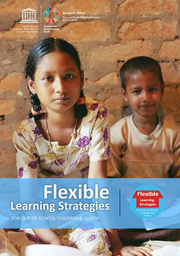Flexible learning strategies for out-of-school children and youth

Despite tremendous efforts to ensure Access to quality education for Out-of-School Children (OOSC) since 2000, universal primary education has not been achieved yet. As one of the ways to put inclusive and accesible education into practice, Flexible Learning Strategies (FLS) has been implemented by both formal and non-formal sectors. What is it and why is it important to reach Out-of-School Children (OOSC)? What are the successful practices? This booklet offers answers to those questions as an intorductory guide to Flexible Learning Strategies (FLS).
Year:
Organisation:
UNESCO Office Bangkok and Regional Bureau for Education in Asia and the Pacific
Keywords:
Out-of-school children, inclusive education, learning strategies
Marginalized & Vulnerable group:
All
Topic:
Inclusive Pedagogy & Practices
Level of Education:
Early Childhood Education, Primary & Secondary
Type of Resources:
Guidelines and Tools
Country/Region:
All, Africa, Arab States, Asia & the Pacific, Europe & North America, Latin America & the Caribbean
Language of Publication:
English